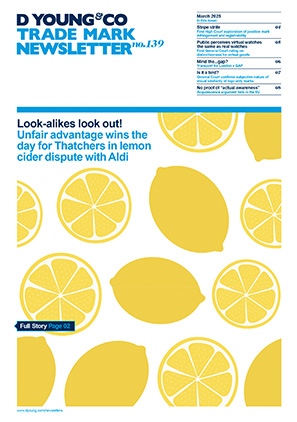“Closely connected” How close is too close?
In a preliminary ruling the Court of Justice (CJEU) provided further guidance on “close connection” under Art. 8(1) of the Brussels I bis Regulation (Regulation No 1215/2012), and found an exclusive distribution agreement between the defendants to be sufficient.
Legal context
Art. 8(1) of the Brussels I bis Regulation reads: “A person domiciled in a Member State may also be sued: (1) where he is one of a number of defendants, in the courts for the place where any one of them is domiciled, provided the claims are so closely connected that it is expedient to hear and determine them together to avoid the risk of irreconcilable judgments resulting from separate proceedings […]”.
The parties
Advance Magazine Publishers is the owner of a number of European Union trade marks (EUTMs) containing the word element “Vogue”, which allegedly enjoy a reputation in the EU. Beverage City Polska, based in Poland, manufactures, advertises and distributes an energy drink under the name “Diamant Vogue”. Beverage City & Lifestyle had an exclusive distribution agreement for Germany with Beverage City Polska. Despite the similarity in the company names, the two entities are purely connected by the exclusive distribution agreement.
Background
Advance Magazine Publishers brought an action for trade mark infringement before the Regional Court of Düsseldorf against Beverage City Polska (and its managing director), and Beverage City & Lifestyle for:
- injunctive relief throughout the European Union; and
- information, disclosure of accounts and declaration of liability for damages, which were later limited to Germany.
The Regional Court of Düsseldorf upheld the action. Beverage City Polska and its managing director appealed. It argued that German courts would not have the international jurisdiction in the action against them, since they had operated and delivered goods to their customers exclusively in Poland.
The appeal court referred the case to the CJEU to decide whether international jurisdiction could stem from Article 8(1) of the Brussels I bis Regulation, and the close connection of the claims, due to the exclusive distribution agreement.
Previously, the CJEU had only confirmed such a close connection where the defendants belonged to the same corporate group (see judgment of 27 September 2017, Nintendo, in cases C 24/16 and C 25/16).
Decision
The CJEU reiterated that closely connected claims require the same situation of fact and law for the divergence to be irreconcilable.
The requirement of same situation of law was satisfied, since the case concerned “the protection of […] exclusive right over EU trade marks” (para. 31).
With regard to the same situation of fact, the CJEU echoed the advocate general’s opinion that “the claims concerned relates primarily to the relationship between all the acts of infringement committed rather than to the organisational or capital connections between the companies concerned” (para. 37).
The CJEU then confirmed a close connection based on the exclusive contractual relationship of customer and supplier. This would make it more foreseeable that such infringements would happen in the future. Furthermore, the close cooperation between the companies was demonstrated through the operation of two websites, which belong to one of the co-defendants and through which the potentially infringing goods were sold.
In short
This decision expands on its previous decisions in relation to closely connected claims and extends this to exclusive distribution agreements. This has practical implications: if an EUTM owner can establish that claims against multiple defendants domiciled in different EU member states are closely connected, the relevant EU court can issue a pan-EU ruling on the infringement.
A broad interpretation of “closely connected” could, in theory, circumvent the rules of jurisdiction laid out in Art. 125 of Council Regulation (EC) No 207/2009 of 26 February 2009 of the European Union trade mark (EUTMR). It will therefore be interesting to see if such a connection can also be established through other contractual relationships.
Case details at a glance
Jurisdiction: European Union
Decision level: CJEU
Parties: i.a. Beverage City & Lifestyle GmbH / Beverage City Polska Sp. z o.o. v Advance Magazine Publishers Inc
Citation: C 832/21
Date: 07 September 2023
Useful links
- Regulation (EU) No 1215/2012, 12 December 2012 (PDF): dycip.com/euregulation-no1215-2012
- Judgment of the Court (second chamber) on joined cases C‑24/16 and C‑25/16, 27 September 2017: dycip.com/c‑24-16-c‑25-16

